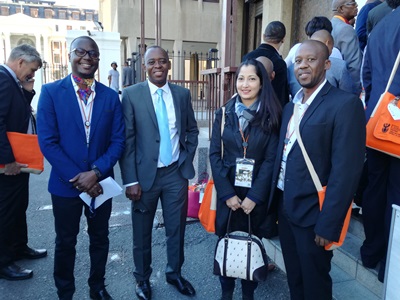In a speech that illustrated the relevance and responsibility of the CSIR in using science, technology and innovation to reverse the plight of marginalised and excluded South Africans, the Minister of Science and Technology, Mrs Naledi Pandor, outlined her Department’s priorities in her budget vote speech in Parliament on 16 May 2017.
Pandor used the opportunity to announce that the Department of Science and Technology (DST) would, in 2018, be presenting to Parliament a draft White Paper on Science and Technology to guide the national innovation system over the next 20 years.
She re-emphasised the DST’s commitment to the National Development Plan, saying that the focus would remain on initiatives that would ensure an impact on economic growth and development, while assisting in the eradication of poverty, unemployment and inequality.
In emphasising the importance of increasing the country’s knowledge production and the transformation of knowledge workers, Pandor referred to the CSIR’s contribution in supporting doctoral, honours and master’s students, alongside the National Research Foundation.
Pandor referred to numerous projects and initiatives led by the CSIR. She said that the DST continues to support the Operation Phakisa ocean economy initiative, referring specifically to the Ocean and Coasts Management Information Systems and its role in protecting the country’s 1.5 million square kilometre exclusive economic zone. The system was on display at the budget vote exhibition and Pandor acknowledged the CSIR’s Raymond Molapo and Bryan McAlister, who were present in the gallery. The system supports the detection and apprehension of illegal fishing vessels and plays a role in providing information on vessels in environmentally sensitive marine-protected areas.
In respect to the budget for the current financial year, Pandor said that the 2017/18 budget was R7,5 billion, just slightly more than the R 7,4 billion of 2016/17. “I don't need to repeat that we must invest more to be competitive. Money spent on science, technology and innovation today will produce economic growth and improved quality of life in the long term,” she said.
Pandor introduced the Industry Innovation Partnership Programme as a complementary initiative to develop partnerships with industry, saying that “the programme is strengthening the strategic role of the CSIR in industrial development.” She said that she would be launching two industrial development centres in the current financial year; a bio-refinery and a photonics prototyping facility (PPF).
“The new bio-refinery facility, located at the CSIR's Durban campus, will provide cutting-edge analytical and pilot-scale equipment for bio-refinery technology development and for troubleshooting industrial biomass-processing challenges.
“The PPF will provide world-class facilities, technical support, equipment and scarce skills to help industrialise photonics-based technologies. This could act as a catalyst to build a globally competitive photonics industry in South Africa, which currently has a tiny share of the global photonics market,” she said.
She also referred to the R150 million investment over the next three years in mining and mining equipment research and development. The Mining Precinct will be launched later this year and is based at the old CSIR mining research facility in Johannesburg.
She also singled out two CSIR-managed projects that she expects to result in new industries in South Africa, namely the Aeroswift project for the 3D printing of aircraft components and the manufacturing of titanium metal powder for a new industry across the full titanium value chain.
The CSIR also featured in her reference to research infrastructure. She emphasised government’s goal to expand, modernise and increase the affordability of ICT infrastructure by providing high-speed broadband connectivity to all universities, science councils, national research facilities and public research performing institutions. The South African National Research Network, which is hosted and managed by the CSIR, now links 215 research sites. She also referred to the Data Skills Development Programme and the Data Intensive Research Initiative of South Africa before acknowledging the efforts of the Centre for High Performance Computing in training a group of students who will represent South Africa at the 2017 International Student Cluster competition after winning the national student competition in East London last year. She said these initiatives contribute to building key skills for the future.
Pandor referred to the establishment of an integrated, multi-sectoral decision-support centre on the CSIR campus. This centre will have capabilities to deal with the collection, transmission, collation, storage and analysis of applicable data sets, as well as decision-support frameworks that transform this data into useful inputs for decision-makers.
She also referred to the building of a science centre in Cofimvaba, in the Eastern Cape, scheduled for completion by 31 March 2018. The CSIR is overseeing the design and construction of this first purpose-designed science centre in South Africa, which will not only demonstrate technology, but also incorporate the latest sustainable technologies throughout the design process.
In addition to the Ocean and Coasts Management Information Systems, the CSIR displayed its mobile internet protocol television for youth and entrepreneurship project, which uses patented technology for the streaming of mobile videos without buffering and the broadcasting of scheduled content in low - and high-bandwidth environments at the exhibition organised to coincide with the budget vote.
Dr Stephanie Fanucchi, a CSIR cell biologist who recently received a 2016 L'Oréal-Unesco for Women in Science International Rising Talent Award, attended the Budget Vote and was acknowledged by the Minister for her award.

Contact Person: Tendani Tsedu, @email, +12 841 3417